- Home
- Gerald Durrell
The Corfu Trilogy (the corfu trilogy) Page 5
The Corfu Trilogy (the corfu trilogy) Read online
Page 5
But the fruit that Achilles liked best were wild strawberries. He would become positively hysterical at the mere sight of them, lumbering to and fro, craning his head to see if you were going to give him any, gazing at you pleadingly with his tiny shoe-button eyes. The very small strawberries he could devour at a gulp, for they were only the size of a fat pea. But if you gave him a big one, say the size of a hazel nut, he behaved in a way that I had never seen another tortoise emulate. He would grab the fruit and, holding it firmly in his mouth, would stumble off at top speed until he reached a safe and secluded spot among the flower beds, where he would drop the fruit and then eat it at leisure, returning for another one when he had finished.
As well as developing a passion for strawberries, Achilles also developed a passion for human company. Let anyone come into the garden to sit and sun-bathe, to read, or for any other reason, and before long there would be a rustling among the sweet-williams, and Achilles’s wrinkled and earnest face would be poked through. If you were sitting in a chair, he contented himself with getting as close to your feet as possible, and there he would sink into a deep and peaceful sleep, his head drooping out of his shell, his nose resting on the ground. If, however, you were lying on a rug, sun-bathing, Achilles would be convinced that you were lying on the ground simply in order to provide him with amusement. He would surge down the path and onto the rug with an expression of bemused good humour on his face. He would pause, survey you thoughtfully, and then choose a portion of your anatomy on which to practise mountaineering. Suddenly to have the sharp claws of a determined tortoise embedded in your thigh as he tries to lever himself up onto your stomach is not conducive to relaxation. If you shook him off and moved the rug it would only give you temporary respite, for Achilles would circle the garden grimly until he found you again. This habit became so tiresome that, after many complaints and threats from the family, I had to lock him up whenever we lay in the garden. Then one day the garden gate was left open and Achilles was nowhere to be found. Search parties were immediately organized, and the family, who up till then had spent most of their time openly making threats against the reptile’s life, wandered about the olive groves, shouting, ‘Achilles… strawberries, Achilles… Achilles… strawberries…’ At length we found him. Ambling along in his usual detached manner, he had fallen into a disused well, the wall of which had long since disintegrated, and the mouth of which was almost covered by ferns. He was, to our regret, quite dead. Even Leslie’s attempts at artificial respiration and Margo’s suggestion of forcing strawberries down his throat (to give him, as she explained, something to live for) failed to get any response. So, mournfully and solemnly, his corpse was buried in the garden under a small strawberry plant (Mother’s suggestion). A short funeral address, written and read in a trembling voice by Larry, made the occasion a memorable one. It was only marred by Roger, who, in spite of all my protests, insisted on wagging his tail throughout the burial service.
Not long after Achilles had been taken from us I obtained another pet from the Rose-Beetle Man. This time it was a pigeon. He was still very young and had to be force-fed on bread-and-milk and soaked corn. He was the most revolting bird to look at, with his feathers pushing through the wrinkled scarlet skin, mixed with the horrible yellow down that covers baby pigeons and makes them look as though they have been peroxiding their hair. Owing to his repulsive and obese appearance, Larry suggested we called him Quasimodo, and, liking the name without realizing the implications, I agreed. For a long time after he could feed himself, and when all his feathers had grown, Quasimodo retained a sprig of yellow down on his head which gave him the appearance of a rather pompous judge wearing a wig several sizes too small.
Owing to his unorthodox upbringing, and the fact that he had no parents to teach him the facts of life, Quasimodo became convinced that he was not a bird at all, and refused to fly. Instead he walked everywhere. If he wanted to get onto a table or a chair, he stood below it, ducking his head and cooing in a rich contralto until someone lifted him up. He was always eager to join us in anything we did, and would even try to come for walks with us. This, however, we had to stop, for either you carried him on your shoulder, which was risking an accident to your clothes, or else you let him walk behind. If you let him walk, then you had to slow down your own pace to suit his, for should you get too far ahead you would hear the most frantic and imploring coos and turn round to find Quasimodo running desperately after you, his tail wagging seductively, his iridescent chest pouted out with indignation at your cruelty.
Quasimodo insisted on sleeping in the house; no amount of coaxing or scolding would get him to inhabit the pigeon loft I had constructed for him. He preferred to sleep on the end of Margo’s bed. Eventually, however, he was banished to the drawing-room sofa, for if Margo turned over in bed at night Quasimodo would wake, hobble up the bed, and perch on her face, cooing loudly and lovingly.
It was Larry who discovered that Quasimodo was a musical pigeon. Not only did he like music, but he actually seemed to recognize two different varieties, the waltz and the military march. For ordinary music he would waddle as close to the gramophone as possible and sit there with pouting chest, eyes half closed, purring softly to himself. But if the tune was a waltz he would move round and round the machine, bowing, twisting, and cooing tremulously. For a march, on the other hand – Sousa for preference – he drew himself up to his full height, inflated his chest, and stamped up and down the room, while his coo became so rich and throaty that he seemed in danger of strangling himself. He never attempted to perform these actions for any other kind of music than marches and waltzes. Occasionally, however, if he had not heard any music for some time, he would (in his enthusiasm at hearing the gramophone) do a march for a waltz, or vice versa, but he invariably stopped and corrected himself half-way through.
One sad day we found, on waking Quasimodo, that he had duped us all, for there among the cushions lay a glossy white egg. He never quite recovered from this. He became embittered, sullen, and started to peck irritably if you attempted to pick him up. Then he laid another egg, and his nature changed completely. He, or rather she, became wilder and wilder, treating us as though we were her worst enemies, slinking up to the kitchen door for food as if she feared for her life. Not even the gramophone would tempt her back into the house. The last time I saw her she was sitting in an olive tree, cooing in the most pretentious and coy manner, while further along the branch a large and very masculine-looking pigeon twisted and cooed in a perfect ecstasy of admiration.
For some time the Rose-Beetle Man would turn up at the villa fairly regularly with some new addition to my menagerie: a frog, perhaps, or a sparrow with a broken wing. One afternoon Mother and I, in a fit of extravagant sentimentalism, bought up his entire stock of rose-beetles and, when he had left, let them all go in the garden. For days the villa was full of rose-beetles, crawling on the beds, lurking in the bathroom, banging against the light at night, and falling like emeralds into our laps.
The last time I saw the Rose-Beetle Man was one evening when I was sitting on a hill-top overlooking the road. He had obviously been to some fiesta and had been plied with much wine, for he swayed to and fro across the road, piping a melancholy tune on his flute. I shouted a greeting, and he waved extravagantly without looking back. As he rounded the corner he was silhouetted for a moment against the pale lavender evening sky. I could see his battered hat with the fluttering feathers, the bulging pockets of his coat, the bamboo cages full of sleepy pigeons on his back, and above his head, circling drowsily round and round, I could see the dim specks that were the rose-beetles. Then he rounded the curve of the road and there was only the pale sky with a new moon floating in it like a silver feather, and the soft twittering of his flute dying away in the dusk.
4
A Bushel of Learning
Scarcely had we settled into the strawberry-pink villa before Mother decided that I was running wild, and that it was necessary for me to have some sort of educa
tion. But where to find this on a remote Greek island? As usual when a problem arose the entire family flung itself with enthusiasm into the task of solving it. Each member had his or her own idea of what was best for me, and each argued with such fervour that any discussion about my future generally resulted in an uproar.
‘Plenty of time for him to learn,’ said Leslie; ‘after all, he can read, can’t he? I can teach him to shoot, and if we bought a boat I could teach him to sail.’
‘But, dear, that wouldn’t really be much use to him later on,’ Mother pointed out, adding vaguely, ‘unless he was going into the Merchant Navy or something.’
‘I think it’s essential that he learns to dance,’ said Margo, ‘or else he’ll grow up into one of these awful tongue-tied hobbledehoys.’
‘Yes, dear; but that sort of thing can come later. He should be getting some sort of grounding in things like mathematics and French… and his spelling’s appalling.’
‘Literature,’ said Larry, with conviction, ‘that’s what he wants, a good solid grounding in literature. The rest will follow naturally. I’ve been encouraging him to read some good stuff.’
‘But don’t you think Rabelais is a little old for him?’ asked Mother doubtfully.
‘Good, clean fun,’ said Larry airily; ‘it’s important that he gets sex in its right perspective now.’
‘You’ve got a mania about sex,’ said Margo primly; ‘it doesn’t matter what we’re discussing, you always have to drag it in.’
‘What he wants is a healthy, outdoor life; if he learned to shoot and sail –’ began Leslie.
‘Oh, stop talking like a bishop. You’ll be advocating cold baths next.’
‘The trouble with you is you get in one of these damned supercilious moods where you think you know best, and you won’t even listen to anyone else’s point of view.’
‘With a point of view as limited as yours, you can hardly expect me to listen to it.’
‘Now, now, there’s no sense in fighting,’ said Mother.
‘Well, Larry’s so bloody unreasonable.’
‘I like that!’ said Larry indignantly; ‘I’m far and away the most reasonable member of the family.’
‘Yes, dear, but fighting doesn’t solve the problem. What we want is someone who can teach Gerry and who’ll encourage him in his interests.’
‘He appears to have only one interest,’ said Larry bitterly, ‘and that’s this awful urge to fill things with animal life. I don’t think he ought to be encouraged in that. Life is fraught with danger as it is. I went to light a cigarette only this morning and a damn’ great bumble-bee flew out of the box.’
‘It was a grasshopper with me,’ said Leslie gloomily.
‘Yes, I think that sort of thing ought to be stopped,’ said Margo. ‘I found the most revolting jar of wriggling things on the dressing-table, of all places.’
‘He doesn’t mean any harm, poor little chap,’ said Mother pacifically; ‘he’s so interested in all these things.’
‘I wouldn’t mind being attacked by bumble-bees, if it led anywhere,’ Larry pointed out. ‘But it’s just a phase… he’ll grow out of it by the time he’s fourteen.’
‘He’s been in this phase from the age of two,’ said Mother, ‘and he’s showing no signs of growing out of it.’
‘Well, if you insist on stuffing him full of useless information, I suppose George would have a shot at teaching him,’ said Larry.
‘That’s a brain-wave,’ said Mother delightedly. ‘Will you go over and see him? I think the sooner he starts the better.’
Sitting under the open window in the twilight, with my arm round Roger’s shaggy neck, I had listened with interest, not unmixed with indignation, to the family discussion on my fate. Now that it was settled, I wondered vaguely who George was, and why it was so necessary for me to have lessons. But the dusk was thick with flower scents, and the olive groves were dark, mysterious, and fascinating. I forgot about the imminent danger of being educated, and went off with Roger to hunt for glow-worms in the sprawling brambles.
I discovered that George was an old friend of Larry’s, who had come to Corfu to write. There was nothing very unusual about this, for all Larry’s acquaintances in those days were either authors, poets, or painters. It was George, moreover, who was really responsible for our presence in Corfu, for he had written such eulogistic letters about the place that Larry had become convinced we could live nowhere else. Now George was to pay the penalty for his rashness. He came over to the villa to discuss my education with Mother, and we were introduced. We regarded each other with suspicion. George was a very tall and extremely thin man who moved with the odd disjointed grace of a puppet. His lean, skull-like face was partially concealed by a finely pointed brown beard and a pair of large tortoise-shell spectacles. He had a deep, melancholy voice, a dry and sarcastic sense of humour. Having made a joke, he would smile in his beard with a sort of vulpine pleasure which was quite unaffected by anyone else’s reactions.
Gravely George set about the task of teaching me. He was undeterred by the fact that there were no school-books available on the island; he simply ransacked his own library and appeared on the appointed day armed with a most unorthodox selection of tomes. Sombrely and patiently he taught me the rudiments of geography from the maps in the back of an ancient copy of Pears Cyclopædia, English from books that ranged from Wilde to Gibbon, French from a fat and exciting book called Le Petit Larousse, and mathematics from memory. From my point of view, however, the most important thing was that we devoted some of our time to natural history, and George meticulously and carefully taught me how to observe and how to note down observations in a diary. At once my enthusiastic but haphazard interest in nature became focused, for I found that by writing things down I could learn and remember much more. The only mornings that I was ever on time for my lessons were those which were given up to natural history.
Every morning at nine George would come stalking through the olive trees, clad in shorts, sandals, and an enormous straw hat with a frayed brim, clutching a wedge of books under one arm, swinging a walking-stick vigorously.
‘Good morning. The disciple awaits the master agog with anticipation, I trust?’ he would greet me, with a saturnine smile.
In the little dining-room of the villa the shutters would be closed against the sun, and in the green twilight George would loom over the table, methodically arranging the books. Flies, heat-drugged, would crawl slowly on the walls or fly drunkenly about the room, buzzing sleepily. Outside the cicadas were greeting the new day with shrill enthusiasm.
‘Let me see, let me see,’ George would murmur, running a long forefinger down our carefully prepared time-table; ‘yes, yes, mathematics. If I remember rightly, we were involved in the Herculean task of discovering how long it would take six men to build a wall if three of them took a week. I seem to recall that we have spent almost as much time on this problem as the men spent on the wall. Ah, well, let us gird our loins and do battle once again. Perhaps it’s the shape of the problem that worries you, eh? Let us see if we can make it more exciting.’
He would droop over the exercise book pensively, pulling at his beard. Then in his large, clear writing he would set the problem out in a fresh way.
‘If it took two caterpillars a week to eat eight leaves, how long would four caterpillars take to eat the same number? Now, apply yourself to that.’
While I struggled with the apparently insoluble problem of the caterpillars’ appetites, George would be otherwise occupied. He was an expert fencer, and was at that time engaged in learning some of the local peasant dances, for which he had a passion. So, while waiting for me to finish the sum, he would drift about in the gloom of the room, practising fencing stances or complicated dancing steps, a habit that I found disconcerting, to say the least, and to which I shall always attribute my inability to do mathematics. Place any simple sum before me, even now, and it immediately conjures up a vision of George’s lanky body swaying and jer
king round the dimly lit dining-room. He would accompany the dancing sequences with a deep and tuneless humming, like a hive of distraught bees.
‘Tum-ti-tum-ti-tum… tiddle tiddle tumty dee… left leg over… three steps right… tum-ti-tum-ti-tum-ti – dum… back, round, down, and up… tiddle iddle umpty dee…,’ he would drone, as he paced and pirouetted like a dismal crane. Then, suddenly, the humming would stop, a steely look would creep into his eyes, and he would throw himself into an attitude of defence, pointing an imaginary foil at an imaginary enemy. His eyes narrowed, his spectacles a-glitter, he would drive his adversary back across the room, skilfully avoiding the furniture. When his enemy was backed into the corner, George would dodge and twist round him with the agility of a wasp, stabbing, thrusting, guarding. I could almost see the gleam of steel. Then came the final moment, the upward and outward flick that would catch his opponent’s weapon and twist it harmlessly to one side, the swift withdrawal, followed by the long, straight lunge that drove the point of his foil right through the adversary’s heart. Through all this I would be watching him, fascinated, the exercise book lying forgotten in front of me. Mathematics was not one of our more successful subjects.
In geography we made better progress, for George was able to give a more zoological tinge to the lesson. We would draw giant maps, wrinkled with mountains, and then fill in the various places of interest, together with drawings of the more exciting fauna to be found there. Thus for me the chief products of Ceylon were tapirs and tea, of India tigers and rice, of Australia kangaroos and sheep, while the blue curves of currents we drew across the oceans carried whales, albatross, penguins, and walrus, as well as hurricanes, trade winds, fair weather and foul. Our maps were works of art. The principal volcanoes belched such flames and sparks one feared they would set the paper continents alight; the mountain ranges of the world were so blue and white with ice and snow that it made one chilly to look at them. Our brown, sun-drenched deserts were lumpy with camel humps and pyramids, and our tropical forests so tangled and luxuriant that it was only with difficulty that the slouching jaguars, lithe snakes, and morose gorillas managed to get through them, while on their outskirts emaciated natives hacked wearily at the painted trees, forming little clearings apparently for the purpose of writing ‘coffee’ or perhaps ‘cereals’ across them in unsteady capitals. Our rivers were wide, and blue as forget-me-nots, freckled with canoes and crocodiles. Our oceans were anything but empty, for where they had not frothed themselves into a fury of storms or drawn themselves up into an awe-inspiring tidal wave that hung over some remote, palm-shaggy island, they were full of life. Good-natured whales allowed unseaworthy galleons, armed with a forest of harpoons, to pursue them relentlessly; bland and innocent-looking octopi tenderly engulfed small boats in their arms; Chinese junks, with jaundiced crews, were followed by shoals of well-dentured sharks, while fur-clad Eskimos pursued obese herds of walrus through ice fields thickly populated by polar bears and penguins. They were maps that lived, maps that one could study, frown over, and add to; maps, in short, that really meant something.

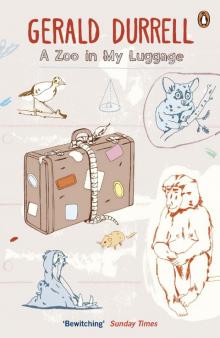 A Zoo in My Luggage
A Zoo in My Luggage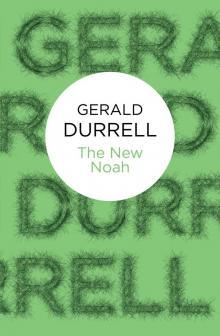 The New Noah
The New Noah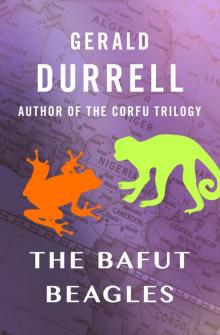 The Bafut Beagles
The Bafut Beagles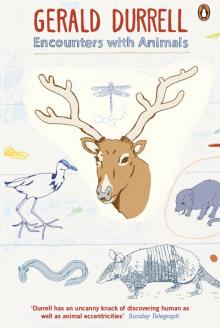 Encounters With Animals
Encounters With Animals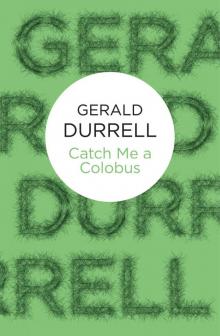 Catch Me a Colobus
Catch Me a Colobus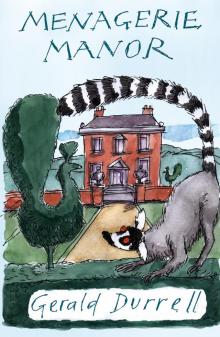 Menagerie Manor
Menagerie Manor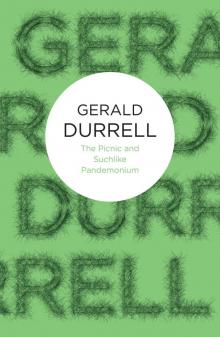 The Picnic and Suchlike Pandemonium
The Picnic and Suchlike Pandemonium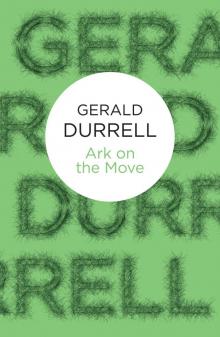 Ark on the Move
Ark on the Move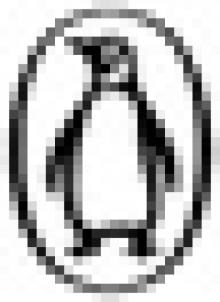 My Family and Other Animals
My Family and Other Animals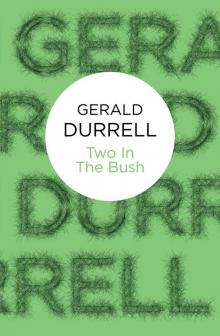 Two in the Bush (Bello)
Two in the Bush (Bello)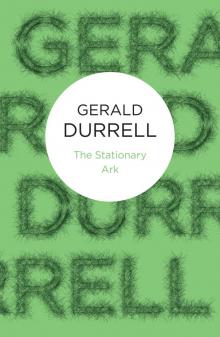 The Stationary Ark
The Stationary Ark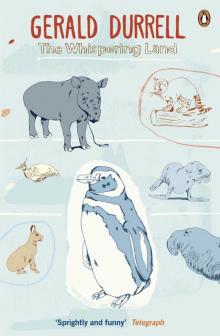 The Whispering Land
The Whispering Land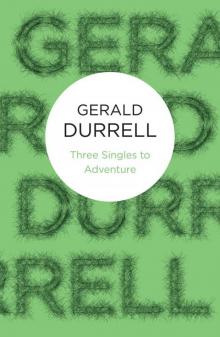 Three Singles to Adventure
Three Singles to Adventure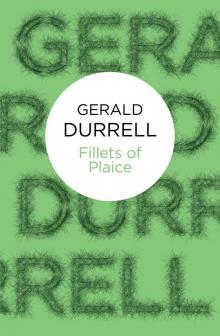 Fillets of Plaice
Fillets of Plaice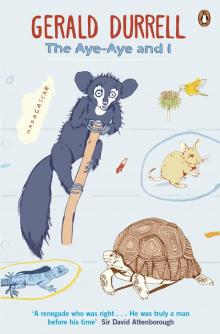 The Aye-Aye and I
The Aye-Aye and I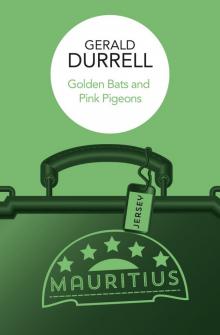 Golden Bats & Pink Pigeons
Golden Bats & Pink Pigeons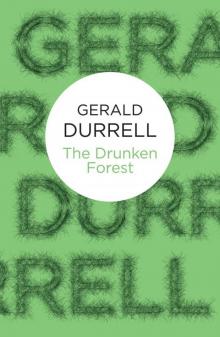 The Drunken Forest
The Drunken Forest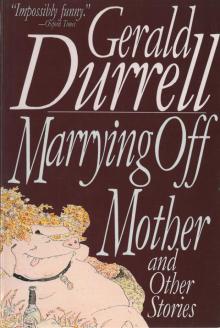 Marrying Off Mother: And Other Stories
Marrying Off Mother: And Other Stories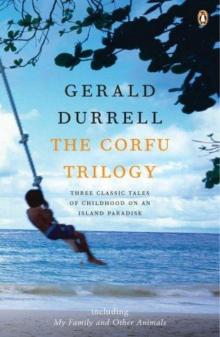 The Corfu Trilogy (the corfu trilogy)
The Corfu Trilogy (the corfu trilogy)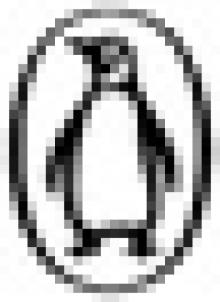 The Corfu Trilogy
The Corfu Trilogy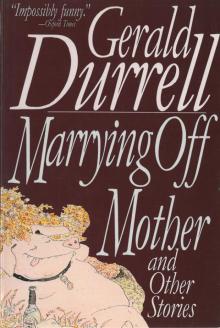 Marrying Off Mother
Marrying Off Mother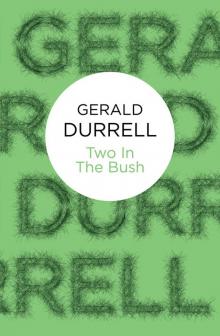 Two in the Bush
Two in the Bush